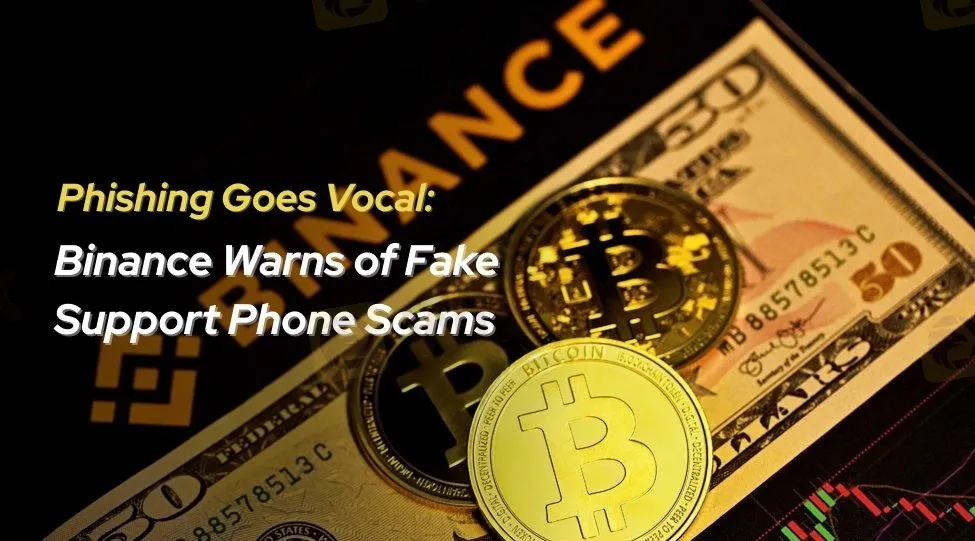简体中文
繁體中文
English
Pусский
日本語
ภาษาไทย
Tiếng Việt
Bahasa Indonesia
Español
हिन्दी
Filippiiniläinen
Français
Deutsch
Português
Türkçe
한국어
العربية
Phishing Goes Vocal: Binance Warns of Fake Support Phone Scams
Abstract:Binance introduces SMS-based security codes as scammers shift tactics from links to phone call traps.

Cryptocurrency exchange Binance has issued a warning regarding a wave of phishing scams that are now taking the form of SMS messages urging recipients to call a fake support number, rather than clicking a suspicious link.
These messages, designed to appear urgent and official, often include prompts such as “Not you?” to create anxiety and pressure the target into making a phone call. The scammers behind these messages then attempt to extract sensitive information by posing as Binance support representatives over the phone.
In response, Binance has extended its Anti-Phishing Code—a user-customized security tag that previously applied to email communication—to SMS notifications. This code helps users verify that a message truly originates from Binance. The feature is now available in all jurisdictions where the platform is officially licensed to operate.
Binances Chief Security Officer, Jimmy Su, confirmed in a statement to BeInCrypto that the company is aware of the increasing number of such scams. “Scammers are using SMS to impersonate Binance and other legitimate senders. These messages often look credible and trick users into revealing credentials or transferring funds,” Su stated.
Binance noted that both users and non-users have reported receiving these messages, suggesting that attackers may be using third-party databases to target phone numbers, regardless of whether the individuals are active Binance customers.
To combat this, Binance recommends verifying the presence of the Anti-Phishing Code in all official messages and encourages users to avoid calling phone numbers embedded in unsolicited texts. Instead, users should confirm all activity directly through the official app or website.
In addition to enabling the Anti-Phishing Code, Binance advises turning on multi-factor authentication and refraining from sharing personal or account-related information by phone. Any suspicious communication should be reported to the platforms support team for investigation.
This latest adaptation of phishing tactics underlines the evolving nature of social engineering in the cryptocurrency space. Rather than relying solely on malicious links, fraudsters are now increasingly turning to direct phone contact—adding a vocal layer to their deception.
Disclaimer:
The views in this article only represent the author's personal views, and do not constitute investment advice on this platform. This platform does not guarantee the accuracy, completeness and timeliness of the information in the article, and will not be liable for any loss caused by the use of or reliance on the information in the article.
Read more

Exnova Forex Broker Scam: Blocked Accounts, Lost Funds
Exnova forex broker slammed for scam tactics, blocking withdrawals, and dodging regulation. Victims warn of fraud risks—steer clear!

TriumphFX Rebrands to Continue Global Fraud: Over RM80 Million Lost
The notorious forex investment company TriumphFX, previously exposed for running a global scam operation for over a decade, is now being accused of rebranding itself to continue defrauding unsuspecting investors. Despite being unregulated and based offshore in Seychelles, TriumphFX has actively targeted Malaysian investors, luring them with false promises and eventually converting funds into cryptocurrency, making recovery nearly impossible.

TriumphFX Faces 29 Exposure Reviews on WikiFX
TriumphFX faces scrutiny with 29 exposure reviews on WikiFX, revealing regulatory warnings from ID BAPPEBTI, VU VFSC, SG MAS, and MY SCM, plus user complaints about withdrawal issues and fraud concerns.

What WikiFX Found When It Looked Into Exclusive Markets
In the fast-growing world of online trading, security and regulation are essential. One company now raising questions in this space is Exclusive Markets, a broker claiming to be regulated, but scrutiny of its licence and operations suggests a more complex picture.
WikiFX Broker
Latest News
OctaFX Flagged by Malaysian Authorities
IronFX Broker Review 2025: A Comprehensive Analysis of Trustworthiness and Performance
Nonfarm Data Lifts Market Sentiment, U.S. Stocks Rebound Strongly
Interactive Brokers Enhances PortfolioAnalyst with New Features
Why Your Worst Enemy in Trading Might Be You
Errante Broker Review
SFC Issues Restriction Notice to GA (Int’l) Capital Management Limited Over Regulatory Concerns
Interactive Brokers Enhance Account Security with FDIC Coverage
Exnova Forex Broker Scam: Blocked Accounts, Lost Funds
Currency Calculator


